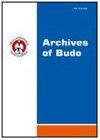Stress in sport situations experienced by people who practice karate
IF 1.5
3区 医学
Q3 SPORT SCIENCES
引用次数: 18
Abstract
Background Sport situations can be difficult. Stress can be a factor which decreases the quality of sports performance, especially during competition. The aim of this study was to identify situations which generate the highest stress levels in karate contestants. Material/Methods: Polish National Kyokushin team members (n=22) participated in the study. Questions concerning training and competitions were answered on a 10 – point scale. Cronbach alfa for questionnaire items were 0.84–0.97. Stress demand level was determined by sports motivation questionnaire. Mean values of males and females were compared by non-parametric tests (p£0.05). Results: Competitions generated higher stress than training. Importance of competition and presence of audience increased stress intensity. Quality of fighting activities modified stress intensity. Stress intensity at the end of karate match remained lower in men than women. Stress during the first selection match and semi-final fight exceeded athletes’ general demand for stress. Stress intensity was lower than the demand for stress during tactical and technical training, free of audience. The dissonance between stress intensity and demand for stress in women in final fights, against stronger opponent, exposed them to psychological discomfort. Conclusions: Psychological and tactical preparations correlate. This manifests by development and realization of a fight plan and reaction to unexpected situation. Differences in reactions between men and women in stressful situations suggest the need for individual approach to training process and at each stage of competition.练习空手道的人所经历的运动压力
运动的情况可能会很困难。压力可能是降低运动表现质量的一个因素,尤其是在比赛中。本研究的目的是确定在空手道选手中产生最高压力水平的情况。材料/方法:波兰国家Kyokushin团队成员(n=22)参与研究。有关训练和比赛的问题以10分制作答。问卷项目的Cronbach alpha值为0.84 ~ 0.97。采用运动动机问卷法测定应激需求水平。采用非参数检验比较男女的平均值(p < 0.05)。结果:比赛产生的压力高于训练。竞争的重要性和观众的存在增加了压力强度。战斗活动的质量改变了应激强度。空手道比赛结束时,男性的压力强度仍然低于女性。预选赛和半决赛的压力超过了运动员的一般压力需求。战术技术训练时压力强度低于压力需求,无观众。女性在最后的战斗中,面对更强大的对手,压力强度和压力需求之间的不协调,使她们面临心理上的不适。结论:心理准备与战术准备相关。这表现在制定和实现战斗计划以及对意外情况的反应。男性和女性在压力情况下的反应差异表明,在训练过程和比赛的每个阶段都需要采取个人方法。
本文章由计算机程序翻译,如有差异,请以英文原文为准。
求助全文
约1分钟内获得全文
求助全文
来源期刊

Archives of Budo
SPORT SCIENCES-
CiteScore
2.80
自引率
47.60%
发文量
0
审稿时长
>12 weeks
期刊介绍:
Archives of Budo is an international peer reviewed journal publishing articles on various aspects of the sports sciences covering education and research in martial arts and combat sports, and related areas like biomechanics, kinesiology, medicine, psychology, sociology, technologies of sports equipment, research in training, selection, performance, survival, and other interdisciplinary perspectives.
Archives of Budo editors endorse the principles embodied in the Helsinki Declaration and expect that all research involving humans has been performed in accordance with these principles. All human studies must have been approved by the investigator''s Institutional Review Board. A copy of the relevant documentation should be included with the manuscript. Furthermore Archives of Budo follows the ICMJE''s Recommendations for the Conduct, Reporting, Editing and Publication of Scholarly Work in Medical Journals.
Archives of Budo provides free, immediate and permanent online access to the full text of all articles distributed under the terms of the Creative Commons Attribution Non-commercial License http://creativecommons.org/licenses/by-nc/4.0), which permits use, distribution, and reproduction in any medium, provided the original work is properly cited, the use is non-commercial and is otherwise in compliance with the license.
 求助内容:
求助内容: 应助结果提醒方式:
应助结果提醒方式:


